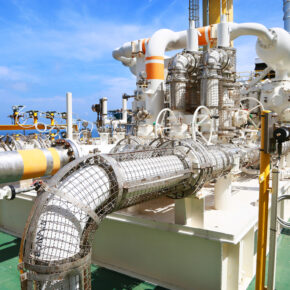
Posted on: 03. 10. 25
In the heart of the Dallas oil and gas industry, Pro-Gas recognizes the increasing importance of sustainable and efficient operations.
Today, we’re exploring the critical role of the Vapor Recovery Unit (VRU) in achieving both emissions reduction and optimal operational efficiency. As regulations tighten and environmental awareness grows, understanding the technical aspects of these units becomes paramount. For those of us working in Dallas oil and gas, it is imperative to understand how VRUs are impacting the industry.
The Core Function of a Vapor Recovery Unit
A Vapor Recovery Unit (VRU) is designed to capture and process vapors that would otherwise be released into the atmosphere. This process not only reduces harmful emissions but also recovers valuable hydrocarbons. We know that the core function is to reduce flare gas and increase hydrocarbon recovery.
Compressor Technology — The Heart of the VRU
At the center of any VRU is its compressor technology. The type of compressor used significantly impacts the unit’s performance and efficiency. Common types include rotary screw, reciprocating, and vane compressors. Each has its advantages and disadvantages, depending on the specific application and the volume of gas being processed.
- Rotary Screw Compressors: These are known for their continuous operation and relatively low maintenance requirements. They are ideal for applications with consistent vapor flow.
- Reciprocating Compressors: These are highly efficient in applications with fluctuating vapor flow and are capable of handling higher pressures.
- Vane Compressors: These are compact and quiet, useful for smaller applications.
Choosing the right compressor technology is essential for optimizing operational efficiency.
Gas Processing and Hydrocarbon Recovery
Once the vapors are compressed, they undergo gas processing to separate the valuable hydrocarbons from other gases. This process typically involves cooling, condensation, and separation techniques. The recovered hydrocarbons can then be reintroduced into the production stream, increasing overall yield. This is where the hydrocarbon recovery becomes a major point of interest.
Environmental Compliance
Environmental compliance is a significant driver for the adoption of VRUs. Regulatory agencies are increasingly stringent on emissions, particularly in areas like Dallas. By implementing VRUs, we can significantly reduce volatile organic compounds (VOCs) and other harmful pollutants. This helps us meet regulatory requirements and demonstrate our commitment to environmental stewardship.
Operational Efficiency and Cost Savings
Beyond environmental benefits, VRUs also contribute to operational efficiency. By recovering valuable hydrocarbons, we can increase production and reduce waste. This leads to significant cost savings over time. Furthermore, reducing flare gas will also increase the amount of sellable product.
Integrating VRUs into Dallas Oil and Gas Operations
In the Dallas oil and gas industry, the integration of VRUs requires careful planning and consideration. Factors such as the specific application, the volume and composition of vapors, and the regulatory environment must be taken into account. Proper installation, maintenance, and monitoring are crucial for ensuring optimal performance and longevity.
Step-by-Step Integration Process
- Site Assessment: Conduct a thorough assessment of the site to determine the volume and composition of vapors being emitted.
- Equipment Selection: Choose the appropriate VRU and compressor technology based on the site assessment.
- Installation: Install the VRU according to manufacturer specifications and regulatory requirements.
- Testing and Commissioning: Conduct thorough testing to ensure the unit is operating efficiently and effectively.
- Monitoring and Maintenance: Implement a regular monitoring and maintenance program to ensure ongoing performance and compliance.
The Impact of VRUs on Emissions Reduction
One of the most significant benefits of VRUs is their contribution to emissions reduction. By capturing and processing vapors, we can significantly reduce the release of harmful pollutants into the atmosphere. This is particularly important in areas with high concentrations of oil and gas operations, such as Dallas.
The Role of VRUs in Reducing Flare Gas
Flare gas is a significant source of emissions in the oil and gas industry. VRUs play a crucial role in reducing flaring by capturing and processing vapors that would otherwise be flared. This not only reduces emissions but also recovers valuable hydrocarbons.
Call on Pro-Gas | VRU Experts
Vapor Recovery Units (VRUs) are essential tools for achieving emissions reduction and maximizing operational efficiency in the Dallas oil and gas industry. By understanding the technical aspects of these units, including compressor technology, gas processing, and hydrocarbon recovery, we can ensure compliance with environmental regulations and optimize our operations. Pro-Gas LLC is committed to providing our clients with the knowledge and technology they need to succeed in this evolving industry.
Contact Pro-Gas LLC today to learn more about our VRU solutions and how we can help you optimize your operations and achieve your environmental compliance goals.
FAQ
Q. What is a Vapor Recovery Unit (VRU)?
A Vapor Recovery Unit (VRU) is a system designed to capture and process vapors that would otherwise be released into the atmosphere, reducing emissions and recovering valuable hydrocarbons.
Q. How does a VRU contribute to emissions reduction?
VRUs capture and process vapors, significantly reducing the release of volatile organic compounds (VOCs) and other harmful pollutants into the atmosphere.
Q. What types of compressor technology are used in VRUs?
Common types include rotary screw, reciprocating, and vane compressors, each with its advantages depending on the application.
Q. How does a VRU improve operational efficiency?
By recovering valuable hydrocarbons, VRUs increase production and reduce waste, leading to significant cost savings.
Q. Why is environmental compliance important in the Dallas oil and gas industry?
Environmental compliance helps meet regulatory requirements and demonstrates a commitment to environmental stewardship, reducing harmful emissions in the area.
Q. How does a VRU reduce flare gas?
A VRU captures and processes vapors that would otherwise be flared, reducing flaring and recovering valuable hydrocarbons.
Q. What is hydrocarbon recovery?
Hydrocarbon recovery is the process of extracting and reusing valuable hydrocarbons from vapors, improving efficiency and reducing waste.


